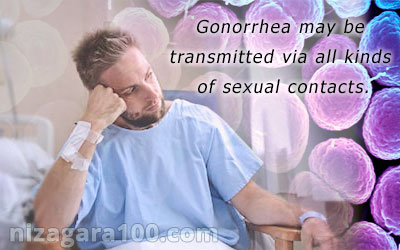Gonorrhea: what should be known about the disease?
Almost half a million Americans get infected with gonorrhea every year. The worldwide statistic says that 0.8% of women and 0.6% of men between the ages of 15 and 49 are infected. Gonorrhea takes second place in the rating of the most common STDs.
Ways of getting infected
To get infected with a gonococcus is quite easy if your sexual partner has the disease. Unlike some other STDs, gonorrhea may be transmitted via all kinds of sexual contacts. Hence, not only vaginal but also anal and oral sex may be dangerous.
In case a pregnant woman is sick, she is almost 100% sure to give the infection to the child. Even though the pathogen dies in the environment under direct sunlight or when it gets heated to 56°C, there’s still a slight probability that it may be transitioned via household contacts (e.g. wet towels).

Gonorrhea manifestations
The main reason why the disease affects so many people is that it doesn’t always cause any symptoms. Hence, even being infected, you may not know about it, and pass the illness on to your sexual partners.
Yet if the symptoms do occur, they may be noticed in 1-3 days after the dangerous contact. In rare cases, it may take up to 30 days to notice any signs.
In men and women, the symptoms are a bit different. Men experience:
- Burning when passing the urine;
- Purulent discharge from the penis (it may be of green, yellow or white color);
- Lower abdominal pain spreading to the perineum;
- Pain and swelling of the testes (in advanced cases).
Speaking about women, they may have:
- Burning during urination;
- Painful urge to urinate;
- Purulent vaginal discharge;
- Bleedings between the periods;
- Pain in the lower abdomen.
In case the disease affected the rectum, the manifestations may be as follows:
- Itching;
- Sores formation;
- Anal discharge;
- Pain and bleedings during defecation.
Probable outcomes of gonococcal infection
In case you notice the signs of the infection, you should turn to the doctors. The sooner you’ll start the therapy, the lower are your chances for long-term health issues caused by the ailment.
Yet if the disease goes unnoticed, it transforms into a chronic form and gets much more difficult to treat. However, taking the right meds will help to get rid of it. In healthy individuals, gonorrhea doesn’t spread to the other organs. Those, with a lowered immunity risk to develop problems with the joints and heart if the disease stays untreated.
Nevertheless, even local infection may result in infertility (both in males and females), ectopic pregnancy and blockage of the fallopian tubes by the scar tissue.
Only a condom can protect you from gonorrhea so, don’t forget to take one on a date.
